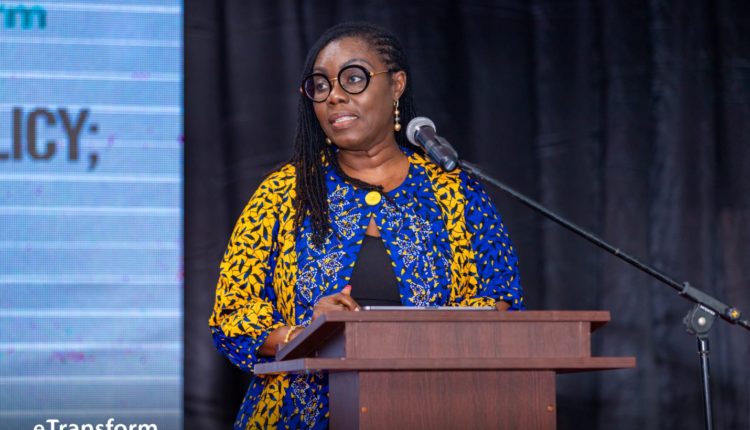Ghana has become the first country in the West Africa sub-region and the fourth in Africa to commence the Digital Audio Broadcasting (DAB) which seeks to permit Frequency Modulation (FM) stations reach cities outside of their surrounding areas and expand their audience, that’s according to the Minister for Communications and Digitalisation, Mrs. Ursula Owusu-Ekuful.
She indicated that, DAB ushers in a new era of radio broadcasting, harnessing digital signals to deliver enhanced sound quality, expanded station choices and interactive features adding that, it promises to be a transformative and engaging listening experience.
According to her, Ghana will deploy the latest version of DAB, that is DAB+ which becomes a great milestone of success of the NCA – an agency under the Ministry of Communications which she supervises.
She made this known when delivering keynote address at the launch of the trial phase of the Digital Audio Broadcasting yesterday, August 22 at the National Communications Authority (NCA) Tower, Airport City, Accra.
“The National Communications Authority (NCA) is today launching the trial of yet another service, Digital Audio Broadcasting, in addition to its ground breaking media monitoring lab, the Common Platform, CERT, among many other innovations introduced in the past 6 years. These have all been focused on meeting the needs of the industry and ultimately, benefiting the consumer.
“With the rapid development of the radio and TV industry and its convergence with telecommunications, it has become necessary to ensure the quality of broadcasting services do not deteriorate. Statistics indicate that as at the end of 2022, the NCA had authorised 707 Frequency Modulation (FM) Stations out of which 513 were in operation. Clearly, this proves that Radio Broadcasting still reigns supreme over other forms of mass media communications as it remains a pivotal source of information and entertainment for both urban and rural communities.”
She served notice that, the new trial starts with 11 radio stations in Accra, while Kumasi will have an additional 7 stations.
She added, “I congratulate the team at NCA and their service providers for putting in the work and ensuring that Ghana continues to blaze the trail in the telecommunication sector for our peers to emulate. I encourage NCA to work speedily in the roll out of their interventions, as this is a fast-changing industry and the NCA needs to be agile to respond quickly to the changing needs of the sector and tastes of the consumer. I also commend the 18 FM stations for availing their stations for this trial, and though many more stations would have liked to be part of this pilot, you were carefully selected based on your diversity of programming content and audience reach. Ghana is introducing the latest version of DAB, known as DAB+ and this progressive step places us at the forefront of innovation, positioning us as the first nation in West Africa and the fourth in the entire continent to deploy DAB+. This achievement underscores our commitment to not only staying abreast of technological advancements but also leading the charge in shaping the future of digital broadcasting across Africa. Together, we shall continue to innovate, elevate our digital landscape, foster growth, empowerment, and prosperity for all and provide boundless opportunities for our young people. It is indeed DIGITIME in Ghana and I am delighted to declare the first ever trial of Digital Audio Broadcasting in West Africa, duly launched.”
The Director General of the National Communications Authority, Joe Anokye on his part noted that DAB has the potential to reshape the radio landscape in Ghana.
“DAB provides good quality audio, supports the provision of value-added services and spectrum efficiency. For example in this trial, up to 18 existing FM stations in Accra and Kumasi will share one frequency channel out of the DFH boundary which is 174 to 230 megahertz and a transmitter in Kumasi and Accra. With the concerns raised about restrictions on authorised coverage areas for FM stations, we will be testing the possibility of extending coverage. Accordingly, in this trial, stations in Accra will extend their coverage to Kumasi and vice versa.”
Benefits of DAB
- Overcoming Frequency Constraints: With severe constraints on FM radio frequencies in major Ghanaian cities, DAB offers a solution to expand coverage and cater for the growing demand for sound broadcasting services.
- Improved Reception Quality: DAB utilizes digital signals, mitigating interference and delivering superior audio quality compared to traditional analogue FM radio.
- Efficient Spectrum Usage: DAB allows more stations to share the same frequency channel and transmitter thereby enhancing energy and frequency efficiency. In this trial, 18 existing FM stations in Accra and Kumasi will share the same frequency channel to deliver DAB services.
- Enhanced Interactive Services: In comparison to FM, DAB allows the transmission of metadata such as text and images for the following – service and programme information, emergency warnings, news, weather and traffic information.
- Ease of Selecting DAB stations to listen: Consumers are able to select DAB stations by searching for the names of the stations instead of memorizing their frequencies.


Comments are closed.